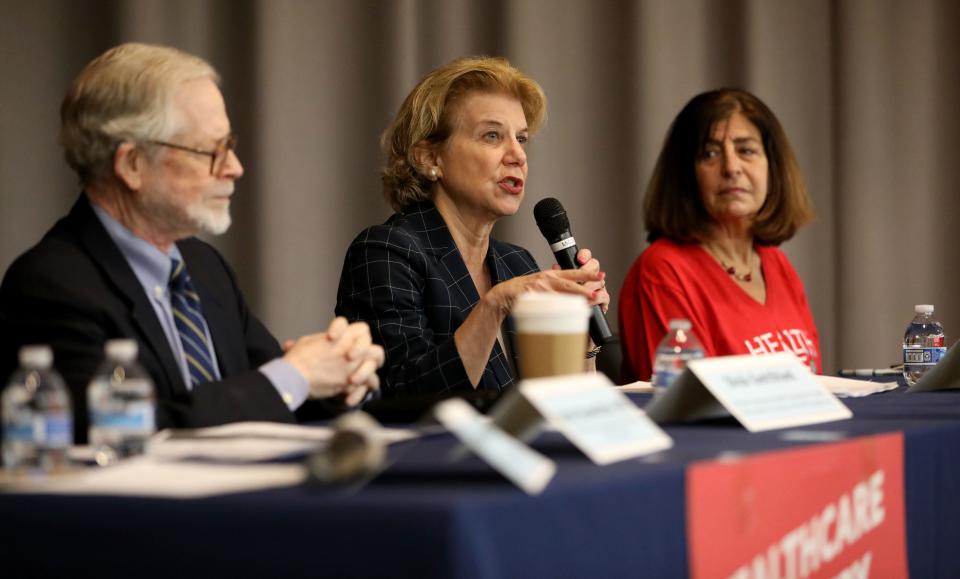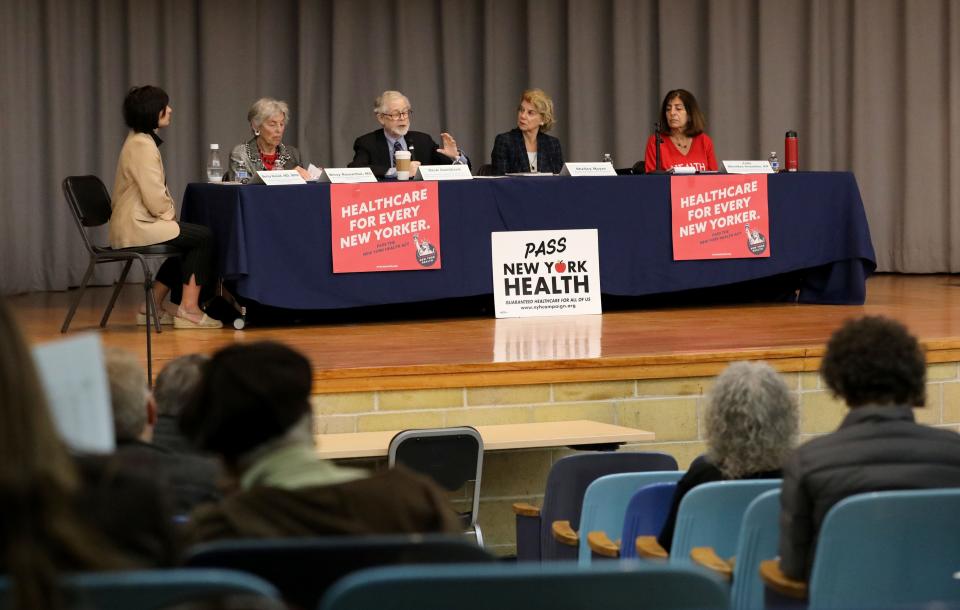Universal health care in NY? Town hall in Yonkers gauges enthusiasm, concerns
Constituents, legislators, doctors and health care advocates gathered Saturday in Yonkers to discuss the New York Health Act, a long-standing bill that would provide "universal health care" for all residents of the Empire State.
A version of the bill has passed the state Assembly four times since its introduction in 1992, and is still awaiting Senate approval. Current legislation is now in the Senate and Assembly health committees as S7590 and A7897.
Advocates for universal health care, in New York and across the country, continue to push for what would be a systemic change to health care. But many oppose the change, including the powerful insurance industry, and it's not likely to be passed in New York soon.
Changing the 'dialogue' about health care
The town hall, held at Yonkers Public Library on April 27, aimed at educating residents about the legislation.
Among topics discussed with a panel of experts were how the bill would work, how it would impact New Yorkers and how it could transform the quality of health care that New Yorkers receive.
State Sen. Shelley Mayer (D-37), who participated as a panelist, said that the bill is an effort to "change the entire dialogue and move to coverage for all."
“You really have to do battle to get the care you need,” said Mayer, whose district includes Yonkers, White Plains, Scarsdale and several more Westchester area towns and villages. “If you don’t have insurance — any insurance — that’s a separate sort of challenge. And then if you have Medicaid or you’re in a Medicaid-managed care plan, there’s challenges there.
“We have a very difficult to manage system that does not work really well for anyone.” Mayer said.

Perceived challenges with the current health care system
A recurring theme throughout the town hall was the obstacles the current health care system creates — not just for patients, but for medical care providers.
“We know that New Yorkers across the state are not receiving high quality health care because of our for-profit health care system,” said Dr. Betty Kolod, executive committee chair of Physicians for a National Health Program (PNHP), New York Metro Chapter, and an organizer of the event. “I'm a primary care doctor for people who use drugs. I see there's so much attention, there's so much discussion — and even investment — in preventing overdoses, and still my patients can't access basic health care.”
Currently, patients access health care in a variety of ways, such as through plan options provided by employers, purchasing directly through an insurance marketplace, or via Medicare or Medicaid. Some New Yorkers opt to go without health insurance entirely.
According to a report published in 2023 by the New York State Comptroller's Office, the amount of uninsured people in New York declined to just 5.2% in 2021, compared to a national average of 8.6%, largely in part due to public policy.
Still, even with insurance, patients may struggle to afford, or even get approval for, the medications and care they need.

“This current system perpetuates the social inequities that exist in our society,” said Judy Sheridan-Gonzalez, a nurse and town hall panelist. She is a past president of the New York State Nurses Association.
“I currently work in an emergency room, so I see sort of the dirty underside of the current health care system every day, all the time,” Sheridan-Gonzalez said. “And I see people powerless to get the health care that they require and that they need.”
“In the Bronx, where I live in work," Sheridan-Gonzalez continued, “we're (ranked) 62 out of all the counties in the state in our health stats, and some of our stats rival Bangladesh, and other underdeveloped countries.”
“It’s ridiculous that we have to go bankrupt to get health care,” said Dr. Betsy Rosenthal, a retired dermatologist and board member of PNHP, New York Metro Chapter. “I am outraged.”
Of interest: Yonkers event calls attention to disparities' impact on Black maternal health
'Taking free-market system out of health care'
The New York Health Act would remove insurance companies from health care and implement “a comprehensive system of access to health insurance for New York state residents,” according to the summary of the Assembly version of the bill.
“Generally speaking, if a doctor recommends it, this bill will provide it,” Mayer said during the town hall.
Not everyone is in favor of the bill. Debbie Kozak, a Yonkers resident of 34 years who attended Saturday’s town hall, left the event feeling like that taking away her right to private health coverage would be “unfair.”
“They would be taking the free-market system out of health care," Kozak said. “As a person who has family members who have life-threatening medical conditions, this is very concerning for me personally.”
Some proponents of the New York Health Act, like Mayer, have concerns, too.
During the town hall, Mayer called the legislation “a mammoth change,” and shared her worries about the bill, including how much it would cost and how it would affect her constituents, many of whom work for health insurance companies.
More: NY approved a $37B Medicaid budget. Where is money going, how will it impact health care?
How would the New York Health Care Act be funded?
It would be funded by an “aggressively graduated tax based on ability to pay,” according to Richard "Dick" Gottfried, now-retired chair of the New York State Assembly Health Committee.
The Assembly bill says that if enacted as law, the New York Health Care Act would establish a "New York Health Trust Fund" that would hold "monies from a variety of sources to be used solely to finance the plan."
In addition, the bill states that the program would be "funded by broad-based revenue based on ability to pay" as well as federal subsidies via Medicaid, Child Health Plus and other programs paid into the trust fund, that would otherwise be paid to New York state.
After the town hall, economist Peter Arno, senior fellow and director of Health Policy Research at the Political Economy Receptions Institute (PERI) at the University of Massachusetts Amherst and board member of PNHP, New York Metro Chapter, spoke briefly about the bill’s cost: “It will cover everybody. It will cost less money for more than 90% of the people, and it will cost businesses less money.”
According to the Assembly bill, health coverage would, to the extent possible, "be replaced and merged into New York Health, which will operate as a true single-payer program."
Ultimately, Mayer said, this is "the bread and butter of the most difficult health care issue facing New York.”
“I come to this conversation very committed to changing the way we provide health care,” Mayer continued. “There’s a better way, and this is a step towards the better way.”
— Photojournalist Mark Vergari and Emerging Audiences Editor Ashley Fontones contributed reporting for this story.
This article originally appeared on Rockland/Westchester Journal News: Yonkers town hall gauges reception to health care for all in NY
